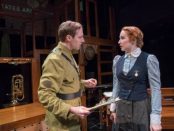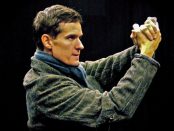59E59 Theaters
The Drama Desk Award-winning 59E59 Theaters is the number one Off-Broadway destination in New York City. In the heart of Midtown, just east of Central Park, 59E59 Theaters is a spectacular modern theater complex with three stages and a lively bar on the mezzanine level. http://www.59e59.org/
Irish actors Niall Buggy and David Ganly returning to their original roles play two murderers sharing a cell in Dublin’s Montjoy Jail. The fiftyish PJ (Ganly) and the sixtyish Christy (Buggy) alternate in their tales, eventually becoming one story. One has committed a crime on impulse and can’t even explain why he did it. The other committed a revenge killing, just like one that killed his father when he was a child watching through the front window. Growing up in a suburb of Dublin, PJ tells us he was an only child with a much loved mother. At seminary, he becomes hopelessly infatuated with a younger fellow seminarian “shining with beauty.” [more]
Bitter Greens
Though it was common practice centuries ago, perhaps the final take-away from "Bitter Greens"--a new play by Clea DeCrane--is that an actor should not perform in her own work. In the play, DeCrane portrays Reyna, a character that is both confused and confusing. She’s also more than a little aloof. When Reyna announces that she’s going “to go on a cleanse,” another character, Caitlin (Jessica Darrow), asks her, “A cleanse from what, vegan bites and vitamin water?” [more]
The Net Will Appear
Gradually, as the course of a year passes, we learn about the characters’ trouble-filled off-stage lives: Rory is coping with being part of a broken family; Bernard suffered loss early in life, and his wife now has medical issues. The growing friendship between the two opposites is obviously meant to create an occasion for epiphany. Too obviously. The drama in the characters’ contrasting lives plays out with boilerplate predictability. It’s all just a little too pat. [more]
The Hello Girls
One of the beauties of the book by Mills and Reichel is that all of the characters in the large dramatis personae are very well defined and we have no trouble knowing who is who. Reichel’s direction and staging make the characterizations clear and consistent. Fishman’s Grace is efficient, fair-minded and heroic, always coming up with good ideas to make sure that things run more smoothly and we root for her throughout the story. As the assured, ambitious Suzanne, Skyler Volpe is very feisty, witty and acerbic, in the manner of an Eve Arden role. Chanel Karimkhani’s Helen, the farm girl, is constantly getting into trouble, not least of which is her problem being late most of the time and her naïveté and lack of sophistication. As the oldest operator and a married woman, Lili Thomas’ Bertha is a rock of stability when others are falling apart. Cathryn Wake’s very French Louise is a firecracker, always speaking her mind - even if it gets her into trouble. Christine O’Grady’s choreography for the dance hall scenes for the women and the doughboys is redolent of ballroom dances of the period. The show’s one flaw is that there is not enough tension until almost the very end when the war comes a little too close for comfort. [more]
Bernie and Mikey’s Trip to the Moon
Playing the developmentally challenged title character Bernie, Stephanie Gould captures the innocence and charm of this young woman, sometimes with broad strokes, but always with sincerity and commitment. A speech impediment called for in the script ultimately comes across as ‘baby talk;’ this affectation is sometimes distracting and annoying, but fortunately never for very long. By contrast, the character of Jeff Goldblum, a young man who Bernie has met in some of her development classes and pursues her relentlessly as a suitor, is revealed to be less-abled by his dialog alone; it’s by what he says, and not how he says it, that the audience understands he is mentally challenged as well. Goldblum is played with humor and disarming quirkiness by Benjamin Rosloff. [more]
Agnes
Unfortunately, Worsham’s efforts just confirm the play’s central problem: only the relationship between June and Charlie has any real depth. As for the rest of the characters, although McMullen’s writing is clever, too many of the lines are focused on eliciting laughs rather than explaining why these people are choosing to shelter together. It doesn’t help matters that the play’s lighting by Cheyenne Sykes and sound design by Daniel Melnick are wholly devoted to overdramatizing Charlie’s Asperger’s while failing to offer much-needed periodic reminders of the torrential plot device that keeps everyone from fleeing the cramped apartment. [more]
Hershey Felder as Irving Berlin
Using a format that has worked for him before in his George Gershwin and Leonard Bernstein evenings, Hershey Felder has returned to 59E59 Theaters in a charming biographical musical as legendary songwriter Irving Berlin. As Felder narrates his story becoming Berlin, he also sings and plays over 30 of his most famous songs, as well as some not so familiar today, including “Blue Skies,” “White Christmas” and the iconic, “God Bless America’. [more]
Less Than 50%
Though there are recurring references to Woody Allen and more specifically to "Annie Hall" during the 90-minute piece, "Less Than 50%" bears as much resemblance to that Oscar-winning film as Gianmarco does to a matinee idol. (According to Gianmarco, his play is not a “rip-off” of "Annie Hall," as Laura says it is, but an “homage.”) It’s telling that instead of the hysterical scene with lobsters in the kitchen in "Annie Hall," we have to contend with a mouse and a mousetrap in "Less than 50%." [more]
Summer Shorts 2018 – Festival of New American Short Plays: Series B
The plays in Summer Shorts 2018 - Festival of New American Short Plays have often had a theme running through all the offerings in one evening, however they were concealed or obscured. This year’s Series B is about two-character relationships at a tense moment in their developments, sort of sparring partners as one of the plays calls it. Unfortunately, the plays in this series by Neil LaBute, Claire Zajdel, and Eric Lane all need further work as they are premises rather than finished plays. [more]
The Originalist
n what easily could have become a one-man show, playwright Strand has cleverly created dramatic tension by first introducing us to a second character and later a third. Set during the 2012-2013 term of the Supreme Court, the play begins with a lecture by Scalia to a law class where he explains his philosophy of being an “originalist,” that is, someone who interprets the Constitution as it was originally written and understood by its drafters in 1789. This presupposes that it is not a living document that should reflect each era, but something carved in stone which does not change but may need interpretation. [more]
All I Want Is One Night
Part of 59E59’s Brits Off-Broadway 2018 festival, Jessica Walker’s "All I Want is One Night" takes place in an odd combination of cabaret and antique shop. Theater B in the 59E59 Theaters complex has been done over as an intimate café with moody lighting by Kate Ashton and extraordinary period perfect costumes (uncredited). It is 1980 in Haut de Cagnes and Suzy Solidor (Walker) in her dotage is about to be painted by Lindstrom (Alexandra Mathie who plays multiple characters in Solidor’s life quite convincingly) and is being cared for by a much younger lady, Giselle (Rachel Austin who also plays Daisy, later in the play). [more]
Secret Life of Humans
Though it wouldn’t be fair to reveal it here for audiences about to see the play, the “secret” actually turns out to be one that has been widely known for some time as it is all over the Internet. The play’s assertion that Bronowski died immediately after his November 1973 television appearance is inaccurate as he died the following summer while visiting friends on Long Island. Nor is there evidence that there was ever a locked room. As Bronowski had four daughters, it is unlikely that one of them was a grandson named “Jamie Bronowski.” The frequent use of technology in the play like having actors walk on the wall as if traversing photographs has been done much more effectively by Cirque du Soleil and others. The quality of the black and white video clips leaves much to be desired. [more]
Tremor
While director David Mercatali has them continually circling each other like boxers in a ring--sparring emotionally, if not physically--Sophie and Tom never really connect or even touch each other, except late in the play when they hold each other’s hand for but a moment. Though they remain somewhat aloof and distant from each other no less than from us, they are given vivid life by the actors who portray them: Lisa Diveney as Sophie and Paul Rattray as Tom. [more]
A Brief History of Women
Although the title covers part of the plot, the play is really a trenchant social history of Britain from 1925 – 1985 in four short sequences, showing the changes that take place in one house over 60 years and following the career of one everyman, Anthony Spates, known familiarly as Tony. It also follows the women in Tony’s life who help him, love him and leave him in each of four decades. While Antony Eden plays the phlegmatic Tony at four stages in his life (17, 37, 57 and 77) with equal aplomb, the rest of the cast play four characters each, a remarkable feat, as time marches on. "A Brief History of Women" has the depth of a novel and the breath of an epic. [more]
Replay
To be sure, there are examples of talented playwrights who have also been able to tread the boards without tripping over their feet, or tongues. Harold Pinter, Noël Coward, Tracy Letts: they all come quickly to mind. Some theater historians have even argued that Shakespeare might have been a pretty good actor, too. But, still, it’s exceedingly rare to find a playwright like Nicola Wren, who can bring her words to life with as much passion and grace as she set them down. [more]
We Live by the Sea
Devised collaboratively by Patch of Blue, a London-based theater company, the play also benefits from a talented supporting cast. Alexandra Simonet makes Hannah’s caretaker fatigue evident before she even says a word, but, somehow, you also never doubt her commitment to Katy. And Lizzie Grace is an absolute delight as Paul Williams, especially during a monologue late in the play, in which she pontificates on the importance of imaginary friends and gives insights into Katy that are both touching and profound. As for Ryan, Tom Coliandris does what he can with his character’s tacked-on back-story, but he shines when he’s simply required to be a warm, caring and decent presence. [more]
The Edge of Our Bodies
Rapp’s plays are so different from each other that it is difficult to classify him. As of now he has written conventional dramas, experimental plays, futuristic and science fiction plays, and dramas on hot button social issues, among others. "The Edge of Our Bodies" is in yet another form: a monologue spoken by Bernadette, a 16-year-old girl who has left her boarding school on a Friday afternoon without permission to come to New York City to tell her 19-year-old boyfriend Michael that she is pregnant. Carolyn Molloy, who does not at all look 16, reads her story from a diary for much of the play and her delivery is that of a reading, not a dramatic performance. [more]
Education
"Education," Brian Dykstra’s new play, is an incendiary investigation into censorship, free speech and responsibility in electric theater. It purports to be about Art as a Weapon but its themes go much further than that. The protagonist Mick, a biracial 17-year-old high school senior, has a rant that lists all the things wrong with American society at this time which is simply scorching. All high school students should be so articulate. In the astute hands of director Margarett Perry, the play moves like greased lightning. You may be dizzy from the provocative ideas but you will not be bored. [more]
Old Stock: A Refugee Love Story
Any further comparisons with the Broadway musical "Come From Away" end with the Nova Scotia setting as Chaim and Chaya quickly settle in Montreal where the 19-year-old Chaim marries the 24-year-old Chaya, who lost her husband on the trek from Romania to Russia to escape the pogroms. (Her husband died of typhus, which becomes a recurring theme in the story that unfolds.) To be sure, their tales are “dark” ones, as put together in the play by an apparent descendent Hannah Moscovitch of the real Chaim and Chaya. [more]
Pete Rex
The homeowner Pete is wearing gym shorts and a T-Shirt and is a biology teacher with an Associate’s Degree who wanted to be a paleontologist. Bo is his childhood best friend. Pete has broken up with his long-term girlfriend Julie. She shows up, interrupting their pastime and informs them of the unexplained appearance of dinosaurs who are on the rampage and causing murderous mayhem. This is confirmed by the sound of television news broadcasts à la "Night of the Living Dead." [more]
Balls
Playwrights Kevin Armento and Bryony Lavery take the well-known facts that have been explored in documentaries and in the feature film "Battle of the Sexes" and shovel on a cascade of imagined sub plots, heavy-handed theatrical techniques and sociological trimmings. The opening voice-over prologue is a wry pseudo-scientific lecture about men and woman. This narrator sounds like Jane Lynch at her most sarcastic and it’s supposed to be funny but falls flat. The strident tone of the show is set. [more]
The Undertaking
Dull, smug and interminable," The Undertaking" is a multimedia play written by Steve Cosson that explores the meaning of death. Jean Cocteau, Marcel Duchamp and Greek mythology are trotted out during this 80-minute hodgepodge. Mr. Cosson is also the director and his physical staging ranges from sedate to overdrive, with the actors incited to be manic. The ending, however, does have an affirmative simplicity. [more]
A Regular Little Houdini
Daniel LLewelyn-Williams in “A Regular Little Houdini” (Photo credit: Sheri Bankes) In 1905, [more]
Cross That River: A Tale of the Black West
Serving as both narrator and protagonist, Harris portrays Blue, a runaway slave who crossed the Sabine River from Louisiana to Texas in search of his elusive freedom. To tell us everything that came before and after this momentous event, Harris is joined by three other impressive vocalists/performers in a concert-style presentation that has all the charm and verve of an old radio play. [more]
Toys: A Dark Fairy Tale
Tunde Skovran as Shari and Julia Ubrankovics as Clara are sensational. The brunette Ms. Skovran and the blonde Ms. Ubrankovics are a dynamic team who each offer vivid portrayals with their powerful physicality and resonant voices that emit differing degrees of an East European accent. The outrageous finale has them gloriously carrying on in an extended, celebratory dance sequence. [more]
The Mad Ones
Kait Kerrigan and Brian Lowdermilk’s original book is filled with incidents, vignettes, reflections, observations, and flashbacks, but short on actual plot. There is deciding on which college to attend, or not to go to college at all in order to find oneself, and the suspense of passing a driving test. A tragic occurrence is a major event. [more]
Knives in Hens
While the script describes the setting as simply a “rural place,” British and European productions apparently have set the play in medieval times. It is definitely pre-industrial as the farmers still need to have their grains ground at a mill and no one has yet seen a pen. Director Paul Takacs, who has staged the equally challenging Dark Vanilla Jungle by Philip Ridley in New York, has reset the play on the American frontier and made use of a multicultural cast. This grounds the play somewhat and makes it easier for Americans to identify with it, but it remains a difficult, challenging play due to its poetic language and its lack of specificity. [more]
Occupied Territories
Well-meaning and sincere," Occupied Territories" is both generic and stereotyped, offering a story television and the movies have been offering for years: the traumatic effect of a father’s Vietnam experience on his family years later. Co-written by Nancy Bannon who appears in the play and Mollye Maxner who directed it, it offers no surprises or new enlightenment. Set in two locales and time frames, the play alternates between scenes in a suburban basement on the day of Stephen Collins’ funeral and scenes from the life of the same man 45 years earlier as a rookie in the jungles of Vietnam. Ironically, the actors playing the soldiers are more convincing than the actresses playing the family members at home in America in the present. [more]
Dolores Claiborne
King’s "Dolores Claiborne" would seem a strange choice for dramatization as the book is a monologue told entirely by its protagonist at a police interrogation over a murder on Little Tall Island off the coast of Maine. Though J.D. McClatchy’s streamlined libretto is very faithful to the book (while eliminating some characters and complications), it never approximates the compelling and wry narrative voice in Dolores’ first-person tale which makes her sympathetic and gives a sense of urgency to her story. Mezzo-soprano Lisa Chavez creates a believably passive character as a maid/companion to a selfish, rich woman whom she is accused of killing and an abused wife saddled with an alcoholic and brutal husband who died 30 years earlier but she brings no sympathy to the role. She just seems a tired, traumatized woman, not very interesting for the leading character in an opera. [more]
No Wake
In 85 minutes, we really don’t learn much Rebecca, Nolan or Sukey as Mr. Donnelly imparts scant biographical details about them, but strangely does for Padgett. Donnelly takes the perennial premise of a divorced couple’s past romantic feelings for each other being reignited and clumsily tosses in the dramatic, morbid bombshell. His glum and stilted finale at Sukey’s apartment is out of Private Lives. The title refers to Sukey’s wish that when she dies that there be no wake. [more]
Small World
Both as written by Stroppel and portrayed by Stephen D’Ambrose (Stravinsky) and Mark Shanahan (Disney), it also becomes clear that they are equally imperious--at first. Though they’re both monomaniacs, its Disney who proves more like a Trumpian narcissist. While Stravinsky says early on, “Everything I say is entirely true,” Disney, a bit later, claims, “I’m never wrong.” The fireworks begin as soon as they start to interact when Disney describes how the music evokes for him the birth of the universe and “earth--in its infancy,” not to mention dinosaurs, which remain the most memorable part of the "Fantasia" segment or sequence [more]
The Violin
In fact, Harry Feiner’s marvelous, you-are-there set design for "The Violin" made me think of 'American Buffalo" (set in a shabby pawn shop) before the first words of the play were even uttered or its three cast-members (Robert LuPone, Peter Bradbury and Kevin Isola) even appeared on the stage. But whether or not playwright McCormick had that early Mamet work in mind, the main idea behind "The Violin" was probably inspired by a real event, when celebrated cellist Yo-Yo Ma left his prized cello in the trunk of a New York taxi some years ago, and paid a handsome reward for its return. [more]

































